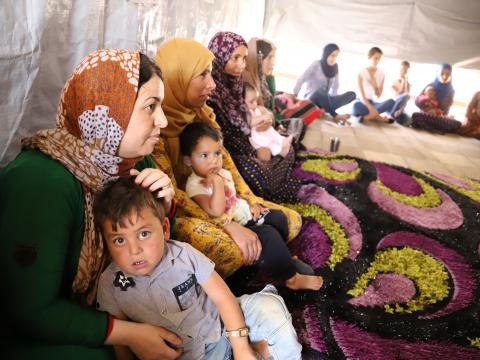My child’s safety is a priority

Syrian refugee families, residing in the informal settlements of the Bekaa Valley, struggle everyday to make ends meet. Some families are forced to resort to asking their children to work. With funding provided by the United States Government and World Vision supporters in the United States and Korea, World Vision is addressing Child Labour among Syrian refugees living in Lebanon through Education and Child Protection. World Vision is providing parenting sessions, for parents whose children are victims of child labor, under the psycho-social support curriculum. The sessions are conducted in 18 different informal settlements.
Throughout these sessions, the mothers learn how to deal with the daily stressors and not take it on their children. They become aware of the importance of communication. After listening carefully to the facilitators, the mothers ask for tips around specific situations they face with their children.
The facilitators emphasize on the fact that all children are fragile and are going through tough conditions at work. The mothers acknowledge the importance of asking about their child’s day and encourage their children to share everything with them.
Shamsa is the mother of Ismail, a 16-year-old boy who works in agriculture. “After attending these sessions, I started to feel worried about my son. I am now aware of the challenges he is facing,” she admits. “Before he goes to work, I prepare his safety kit: gloves and hat, along with some food,” she continued, “and when he comes home from work, I make sure his lunch is ready.”
“I noticed the progress on a personal level. For example, Ismail had a broken leg and yet I obliged him to work because we needed the money and we depended on him. However, if he is injured in any way, I will insist that he rests,” she confesses, “I am a different person. I am more considerate of my child’s safety and I understand that it is a priority,” Shamsa continues.
“When Ismail gets his salary, I do not take all of his money. He earned it, so I take some of it for the necessary goods we need,” says Shamsa. “I notice the impact of these sessions on all the mothers. We are all a lot more positive, calmer and ready to communicate with our children,” Shamsa admits.
Dalal, 27, left Syria two years ago and came to Lebanon with her two younger sisters and brother, in search for work. Dalal could not afford all the family expenses especially that her parents in Syria are in need for money too. Dalal, her brother Ismail, 16, and her sister Amira, 12, started to work a year ago, in agriculture. “When my sister went to work all I cared about was money. A year later and thanks to the sessions, I realized that Amira and Ismail are not safe. Aside from constantly reminding them about the importance of wearing gloves and the right shoes, I always insist that they rest, when they need to,” explains Dalal.
Dalal and Shamsa are among 276 caregivers within the Syrian refugee communities in the Bekaa valley who, through World Vision, are currently learning about protecting children from abuse, positive parenting, and the risks of child labor.